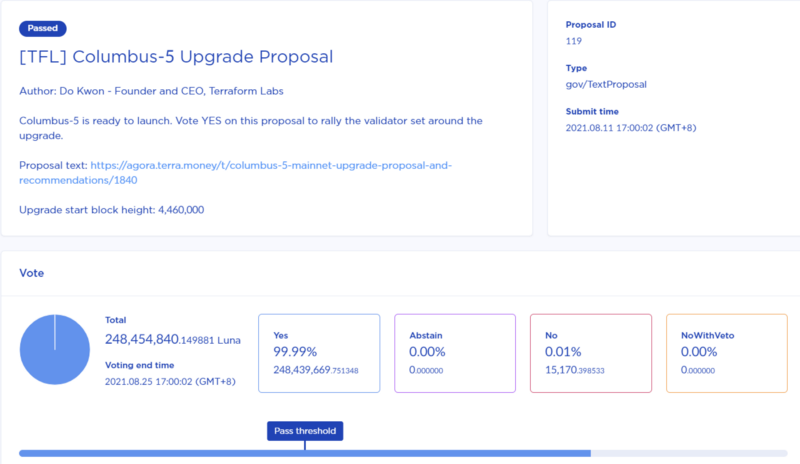The Current State of Delegation in Terra
Delegation plays an important part in a Proof of Stake blockchain such as Terra. This article takes a deep dive into the current state of delegation on Terra.

Delegation plays an important part in a Proof of Stake blockchain such as Terra. This article takes a deep dive into the current state of delegation on the Terra blockchain.
- What is a validator
- Need of delegation?
- Current state
Interested?… Well, read on!
Validators and Delegators
Terra blockchain follows a special type of ‘Mining’ called Delegated Proof of Stake. The first iteration of DPoS was developed in 2014 by former EOS Chief Technology Officer (CTO) Dan Larimer. In this model, a set of 130 plus validators run nodes to validate a transaction.
Users can stake their Luna to any validators to keep the network decentralized, secure and earn rewards. This process is called delegation.
Let’s dive more deeply into these.
Delegated Proof of Stake is a faster and fairly decentralized consensus model than Proof of Work. According to the Terra white paper, the protocol selects one of the validators and entrusts the responsibility to produce the next block. This selected validator is also responsible for achieving consensus among miners and ensuring that messages are distributed properly in a short timeframe with high fault tolerance.
The protocol chooses a validator randomly; after successfully validating a transaction, the fees will be distributed to the delegators according to their stake. The more you stake, the more transaction fees you will get as a reward.
Luna holders can delegate their ‘bags’ to any of these validators to earn staking rewards, airdrops, etc. The validators get a part of this staking reward as commission too. So it’s a win-win.
How are validators rewarded?
Miners are compensated in two ways.
- Transaction fees: Currently, a default of 0.1% capped at 1% of all transitions in Luna is given to validators.
- When demand for Terra increases, the system mints Terra and earns Luna in return. This is called seigniorage — the value of newly minted currency minus the issuance cost (which is zero). The system burns all of this earned Luna, which makes mining power scarcer(after Columbus 5).
- Compute Fees: Validators attach a fee to process transactions on their node on the protocol. This is to prevent spamming whatever is shared with their delegators based on their stake in the node.
- Commission Fees: Delegators are also entitled to a part of the commission fees set by their validator on the Terra protocol.
Need for Delegation
Delegation keeps the network decentralized. In Proof of Stake systems like Terra, staking is important for keeping the network decentralized and stable.
Delegators will be incentivized by giving out rewards in Luna and a bunch of other stable coins. The current APY of this staking reward is 3.14%, which may increase to double-digits when Columbus 5 upgrade takes full effect.
Staking in Terra Station enlists the delegators in future airdrops. A plethora of apps are in development in the Terra ecosystem, and you may be eligible for those genesis airdrops by delegating. For example, you will be entitled to an airdrop if you delegate in Orion money when Orion protocol launches.
Delegators can participate in voting. When a proposal comes from the community for voting, delegators have the power to vote for or against that proposal. You will be rewarded for voting after Columbus 5.

The current state of Terra delegators
The decentralization of a network can be usually measured using the Gini coefficient. Lower the Gini co-efficient better decentralized the network.
Terra cannot be considered a highly decentralized network; actually, none of the DPoS networks can be because the network will have a maximum of 30–140 validators only. From the graph, we can see that the average Gini coefficient always sits around 0.50. But on a macro scale, it’s somewhat trending downwards.

Around 35% of the total Luna is currently staked in Terra Station. The value of staked supply is increasing, but it’s mostly due to the price appreciation of Luna.
Let’s look at who the top delegators are.
terra1dp0taj85ruc299rkdvzp4z5pfg6z6swaed74e6, which is the wallet address for Terra Foundation. This address has delegated over 40 validators.
Thanks, Ah Kek, for this information.
We are not so sure who the other delegators are.

Around 40% of the voting power are concentrated in the top 10 validators. Delegators choose them because of their long uptime, trust and potential of genesis airdrops.
In the past 12 months, 15 validators have been slashed due to less than 100% uptime. When a validator is slashed, the delegated Luna in those validators also gets slashed. Slashing is something users must consider before delegation.
Commission of each validators may also play an important role while choosing a validator. Delegators usually tend to select validators with 0% commission. But most of these 0% commissions are usually promotions, and they might increase it in the future. Lunatics must check Max. Commission Rate and Max. Daily Commission Change also before the delegation.

Conclusion
The current DPos mechanism of Terra is way faster and cheaper than other consensus mechanism networks. Validators and delegators play an important role in keeping this DPoS network running efficiently. Terra delegators Gini score shows their delegation process is fairly concentrated, but it’s in a downtrend. This concentration is due to several factors, including trust, airdrop consideration and commission.